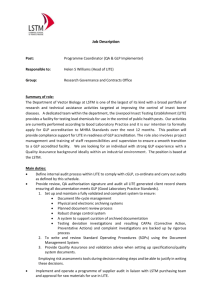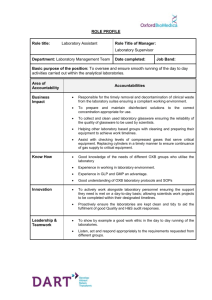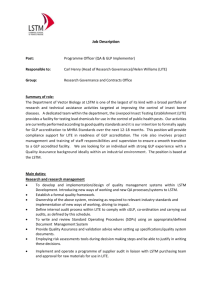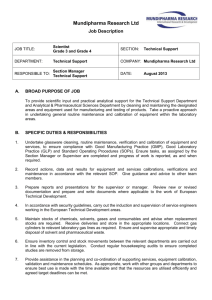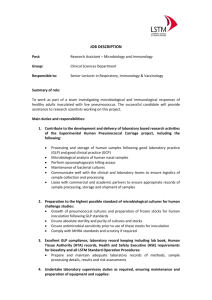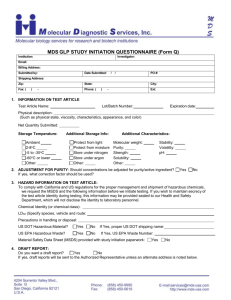GOOD LABORATORY PRACTICE
advertisement
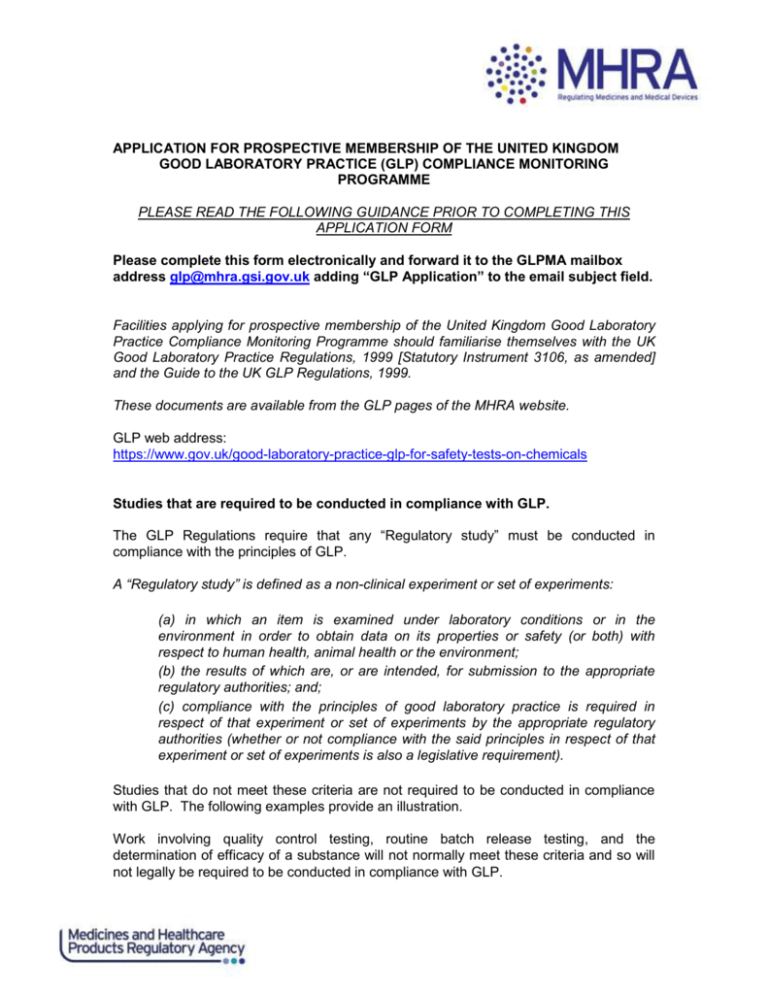
APPLICATION FOR PROSPECTIVE MEMBERSHIP OF THE UNITED KINGDOM GOOD LABORATORY PRACTICE (GLP) COMPLIANCE MONITORING PROGRAMME PLEASE READ THE FOLLOWING GUIDANCE PRIOR TO COMPLETING THIS APPLICATION FORM Please complete this form electronically and forward it to the GLPMA mailbox address glp@mhra.gsi.gov.uk adding “GLP Application” to the email subject field. Facilities applying for prospective membership of the United Kingdom Good Laboratory Practice Compliance Monitoring Programme should familiarise themselves with the UK Good Laboratory Practice Regulations, 1999 [Statutory Instrument 3106, as amended] and the Guide to the UK GLP Regulations, 1999. These documents are available from the GLP pages of the MHRA website. GLP web address: https://www.gov.uk/good-laboratory-practice-glp-for-safety-tests-on-chemicals Studies that are required to be conducted in compliance with GLP. The GLP Regulations require that any “Regulatory study” must be conducted in compliance with the principles of GLP. A “Regulatory study” is defined as a non-clinical experiment or set of experiments: (a) in which an item is examined under laboratory conditions or in the environment in order to obtain data on its properties or safety (or both) with respect to human health, animal health or the environment; (b) the results of which are, or are intended, for submission to the appropriate regulatory authorities; and; (c) compliance with the principles of good laboratory practice is required in respect of that experiment or set of experiments by the appropriate regulatory authorities (whether or not compliance with the said principles in respect of that experiment or set of experiments is also a legislative requirement). Studies that do not meet these criteria are not required to be conducted in compliance with GLP. The following examples provide an illustration. Work involving quality control testing, routine batch release testing, and the determination of efficacy of a substance will not normally meet these criteria and so will not legally be required to be conducted in compliance with GLP. If the study is being conducted in humans (i.e. human clinical trials) or on materials obtained as part of a human clinical trial, then it does not constitute non-clinical experimentation and falls outside the scope of the GLP regulations. Only facilities that conduct regulatory studies as defined in the GLP regulations will be admitted to membership of the GLP compliance programme. Conditions under which UK facilities are admitted into the UK GLP Compliance Programme. The GLP Regulations require that “Regulatory studies” (those studies carried out to demonstrate the safety or properties of a chemical or biological substance, and which are intended for submission to a regulatory authority) must be performed at test facilities that are members, or prospective members, of the UK GLP compliance monitoring programme. A regulatory authority, as referred to above, is any government agency in the UK or overseas which receives submissions for the marketing of human pharmaceuticals, veterinary medicines, agrochemicals, food additives, animal feeds additives, biocides, cosmetics and industrial chemicals. Membership of the UK GLP compliance monitoring programme is not voluntary. If a test facility is conducting a regulatory study, then that test facility must by law be a member of the UK GLP compliance programme and that study must be conducted in compliance with the Principles of GLP. Obligations of the Operator. The GLP Regulations define the “Operator” as “the person having control of the test facility”. This person needs to be identified in company documentation. They should be aware of their responsibilities and legal obligations. The “Operator” is responsible for ensuring that the test facility and the studies conducted therein remain in compliance with the principles of Good Laboratory Practice. Failure to do so is a criminal offence and may result in a fine or imprisonment or both. When test facilities conduct both studies that do and do not require compliance with the principles of Good Laboratory Practice, the standard of all work must be such that the compliance of the GLP requiring studies is not compromised. Operators’ attention is drawn to Regulation 16 and paragraph 16 of the Guide, which relates to the fees that are required for membership of the UK GLP compliance monitoring programme. Details of current fees may be obtained from the GLP pages of the MHRA website. Operators should be aware of the distinction between “Prospective Membership” and “Membership” of the UK GLP compliance monitoring programme. Once accepted as a “Prospective member” the test facility is able to lawfully undertake studies, or phases thereof, for which compliance with the GLP principles will be claimed without being in breach of Regulation 4 of the UK GLP Regulations. If, following a successful inspection by the GLPMA the test facility is admitted to full membership of the compliance programme, then any claims of GLP compliance will be sustained. However, if the GLP inspection identifies significant deviations from the principles of GLP, any previous claims for GLP Compliance of studies, or parts thereof, must be withdrawn. Membership of the UK GLP compliance monitoring programme is achieved following a successful inspection. Following a successful inspection, the Operator will be issued with a “Statement of GLP Compliance”. NOTE: If you have any doubts concerning the requirement for your test facility to be a member of the UK GLP compliance monitoring programme, please contact the GLPMA directly at glp@mhra.gsi.gov.uk before completing this application form 1. What is the name and address of the test facility that is the subject of this application? Company Name: Address: company registered address and number as held at companies house if different to above Website: 2. Are there premises at another address that form part of this test facility? If so, please give details. 3. Please identify the “Operator” of the test facility that is the subject of this application. This person will have legal responsibility for ensuring that the UK GLP Regulations are complied with. Please note, that to avoid a conflict of interests, this person should not act as a study director or principal investigator for GLP studies. Name: Position: Telephone: Email: 4. Person we can contact about this application (if different from above) Name: Position: Telephone: Email: 5. What type of product will you be testing? E.g. a pharmaceutical, an agrochemical, an industrial chemical, a biocide or other (please specify)? 6. What is the objective of the work/studies you intend to perform? 7. Is the study/work required to be conducted in compliance with GLP? Is this requirement specifically laid down in national legislation? If yes, please provide a reference to the applicable legislation (e.g. Regulation (EC) No. 1107/2009 on placing plant protection products on the market.) and go to question 9. 8. If there is no legislative requirement for this work to be conducted to GLP, has a national regulatory authority specifically requested that the study/work is to be conducted in compliance with GLP? If yes, please give details (including a named contact) and identify which regulatory authority has made this request (e.g. The Chemicals Regulation Directorate) and go to question 9. 9. Why does this work need to be conducted to GLP? (Only applicable if you have answered “No” to both questions 7 and 8) 10. Do you intend to conduct work that does not constitute a full GLP study, but will constitute a phase of, or be used to support a full GLP study? 11. If you will be conducting complete GLP compliant studies (under the control of your own study director), is there the possibility that some study phases would be conducted by another party, including the study sponsor? 12. Please provide details concerning the legal entity (i.e. name as registered at Companies House or sole traders applicable) ownership, management and organisation of the test facility; e.g. is it a private company, a wholly owned subsidiary, a department of a larger organisation etc. 13. How many staff are employed by the test facility? How many of these staff will be directly engaged in, or support the work for which GLP compliance will be claimed? 14. Have staff have received recent (within the last year) training in GLP? Please provide details. 15. Are any areas shared with non-GLP compliant activities? If so please give details. 16. Are there other facilities owned by, or linked to your company that are members of the UK GLP compliance monitoring programme? If so please give details. 17. Are there any other independently verified quality systems maintained in the areas claiming compliance? (e.g. GMP, UKAS ISO17025, ISO 9000:2000) If yes, please give details. 18. Is there a documented procedure for the production, control and revision of formal documentation (e.g. standard operating procedures and policy documents)? If yes, please provide a copy with this application? 19. Quality Assurance 19.1. What are the provisions for Quality Assurance monitoring of the test facility and the work conducted therein? 19.2. Are there documented procedures that describe how QA activities will be planned, performed and reported? If yes, please provide a copy with this application. 19.3. Are QA staff independent of the conduct of GLP studies? 20. Archives 20.1. What constitutes the archive facilities? If utilising an off site contract archive facility please give details. 20.2. Who is the appointed archivist and are they independent of GLP study conduct? If they have other functions within the GLP structure please describe these roles. 20.3. Is there a documented procedure to describe placement into, and removal of items from, the archive? If yes please provide a copy with this application. 21. How will the master schedule be compiled and maintained? 22. Computerised systems and Instrumentation 22.1. Will computerised systems be used in GLP studies? A computerised system is defined as a group of hardware components and associated software designed to perform a specific function. Computerised systems may be used to capture, manipulate or store raw data. Common examples include HPLC systems, spreadsheets for data manipulation and statistical analysis packages. If yes, please provide an overview of the types of systems and whether they are bespoke custom built systems or proprietary packages. 22.2. Are there documented procedures in place to ensure that computerised systems are installed, validated, operated and maintained to ensure that the GLP principles are complied with? If yes, please provide a copy with this application 23. Activities which fall within the scope of GLP Please tick one or more boxes below to indicate which activities you believe take place within the test facility for which GLP compliance will be claimed. Analytical Chemistry Animal toxicology Bioanalysis Ecotoxicology Environmental fate Field trials Genetic toxicology Histology/Pathology Metabolism/Pharmacokinetics Physical/chemical testing Other If “Other” please provide details and indicate why you believe that this work falls within the scope of work for which GLP compliance is a regulatory requirement. Submission of this form indicates that the systems described above are fully operational and that the proposed facility considers that it is operating in accordance with the Principles of Good Laboratory Practice as described by Statutory Instrument 3106:1999 The Good Laboratory Practice Regulations. Following submission you will be notified, in writing, whether you have been accepted as prospective members of the UK GLP Compliance Monitoring programme. If accepted, a formal inspection against SI 3106:1999 will be conducted within 12 weeks. Details of person completing this application form Name: Position: Telephone: Email: GUIDANCE AND REFERENCE MATERIAL The UK GLP Regulations and the “Guide to the UK GLP Regulations” are available form the GLP pages of the MHRA website. These GLP pages also contain current guidance and advice on other aspects of GLP compliance that may be of relevance to test facilities which are applying to join the UK GLP compliance monitoring programme. GLP Website: https://www.gov.uk/good-laboratory-practice-glp-for-safety-tests-on-chemicals The OECD Guidance Series on Principles of Good Laboratory Practice and Compliance Monitoring, and other guidance documents are available from their website http://www.oecd.org/document/63/0,3343,en_2649_34381_2346175_1_1_1_1,00.html The Good Laboratory Practice Regulations 1999 and a Guide to the UK GLP Regulations can be accessed on the government legislation website at. http://www.legislation.gov.uk/ The Guide is also available on the MHRA website www.mhra.gov.uk If you require any further information to help you complete this form, please contact the GLPMA directly. Please e-mail with the subject heading “GLP Application” to glp@mhra.gsi.gov.uk
